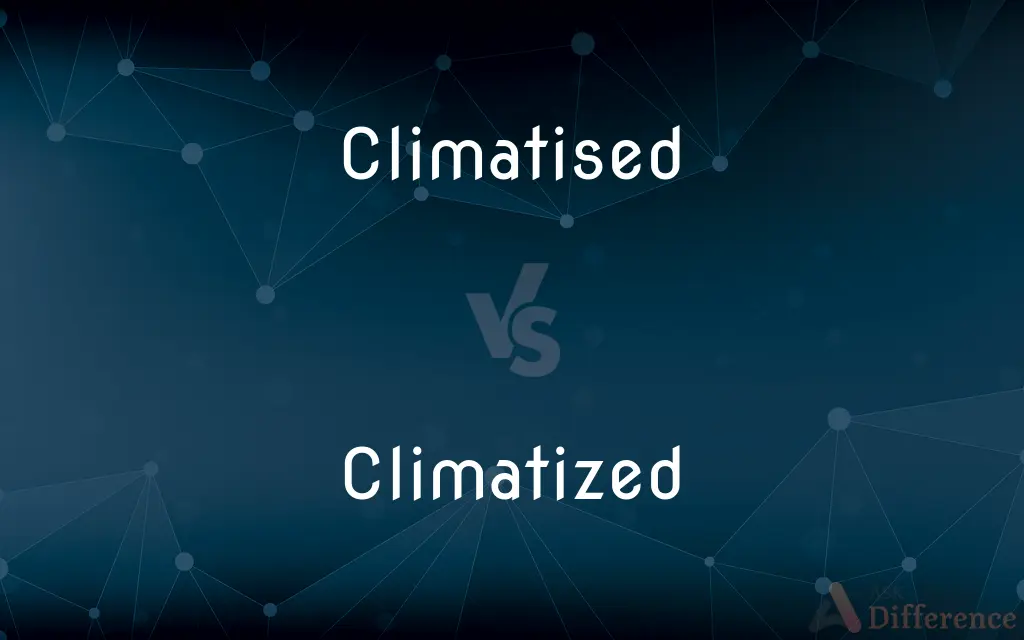Climatised vs. Climatized — What's the Difference?
By Maham Liaqat & Urooj Arif — Updated on April 23, 2024
Climatised and climatized both refer to adaptation to a new climate, but "climatised" is more common in British English, whereas "climatized" is preferred in American English.

Difference Between Climatised and Climatized
Table of Contents
ADVERTISEMENT
Key Differences
Climatised refers to the process of becoming accustomed to a new climate or environment, typically involving physiological or behavioral changes. Whereas climatized also describes the same adaptation process but tends to be used more frequently in American contexts.
Climatised is often used in discussions related to ecology and human adaptation to environmental changes. On the other hand, climatized might be used in both ecological contexts and in discussions about mechanical systems like heating and cooling adaptations in buildings.
In British English, "climatised" is the more traditional and preferred spelling. Conversely, in American English, "climatized" is the standard form, reflecting the American spelling conventions.
When used in scientific and technical literature, "climatised" can sometimes imply a natural or biological adaptation process. Whereas "climatized" is often used to indicate both natural adaptations and artificial adjustments such as those made by technological systems.
Comparison Chart
Preferred Usage
British English
American English
ADVERTISEMENT
Context
Often biological or ecological adaptations
Used for both ecological and technological adaptations
Spelling Variants
Climatised, climatising
Climatized, climatizing
Associated Terms
Adaptation, acclimatization
Adaptation, acclimatization, conditioning
Common Applications
Discussing human and animal adaptations
Used in both biological and building systems adaptations
Compare with Definitions
Climatised
Made suitable for a particular climate.
These plants have been climatised for indoor growth.
Climatized
Adjusted to different climatic conditions.
The building's HVAC system is climatized for efficiency.
Climatised
Prepared to endure environmental conditions.
The expedition team was climatised for extreme cold.
Climatized
Made compatible with climatic requirements.
The software is climatized for various operating temperatures.
Climatised
Acclimated through gradual change.
Climatised slowly, the researchers avoided altitude sickness.
Climatized
Adapted to a new climate after relocation.
He quickly climatized to the desert environment.
Climatised
Conditioned for performance in specific weather.
The sports gear is climatised to reduce moisture.
Climatized
Acclimated to environmental changes.
The scientists were climatized to the high-altitude conditions.
Climatised
Adjusted to a new climate or condition.
After a year in tropical weather, she felt fully climatised.
Climatized
Conditioned to withstand specific climates.
The machinery is climatized to operate in high humidity.
Climatised
Simple past tense and past participle of climatise
Climatized
Adapted or accustomed to local (especially climatic) conditions. Now rare.
Climatized
= climate-controlled.
Climatized
Having a controlled temperature.
They installed a climatized wine cabinet.
Climatized
Simple past tense and past participle of climatize
Common Curiosities
What does climatized mean?
Climatized also means adapting to a different climate, particularly in an American English context.
Are climatised and climatized interchangeable?
Yes, they can be used interchangeably, though usage might depend on regional spelling preferences.
How do you spell climatised/climatized in British and American English?
In British English, it's spelled "climatised," and in American English, it's spelled "climatized."
What does climatised mean?
Climatised refers to the adaptation or acclimation to a new or different climate.
Is there a difference in the usage context for climatised and climatized?
Climatised is more common in biological contexts, particularly in British English, while climatized can also refer to mechanical systems, especially in American English.
Is climatised used in medical terms?
Yes, climatised can be used to describe physiological adaptations to new climatic conditions in medical contexts.
How long does it take to climatize to a new climate?
The time it takes to climatize can vary depending on individual factors and the extent of the climate difference.
Why is it important to climatize technological equipment?
Climatizing technological equipment ensures it operates efficiently and safely under varying environmental conditions.
How do ecologists use the term climatised?
Ecologists use the term to discuss how animals and plants adapt to changes in their habitats due to climatic shifts.
Can plants be climatised?
Yes, plants can be climatised to different environments, making them better suited to survive and thrive.
What does it mean for a building to be climatized?
It means the building has been adapted, usually through heating, ventilation, and air conditioning systems, to maintain a comfortable indoor climate.
Can people get climatised to high altitudes?
Yes, people can get climatised to high altitudes by gradually acclimating to lower oxygen levels.
What are some challenges of climatizing to extreme climates?
Challenges include physical health risks, equipment failure, and increased energy demands for maintaining stability.
Can climatised refer to psychological adjustments?
While it's less common, climatised can refer to psychological adjustments to new environmental stresses.
What role does acclimatization play in being climatized?
Acclimatization is the process that supports climatization, helping organisms adjust to new temperatures and environments.
Share Your Discovery

Previous Comparison
Addressee vs. Sender
Next Comparison
Bestow vs. BequeathAuthor Spotlight
Written by
Maham LiaqatCo-written by
Urooj ArifUrooj is a skilled content writer at Ask Difference, known for her exceptional ability to simplify complex topics into engaging and informative content. With a passion for research and a flair for clear, concise writing, she consistently delivers articles that resonate with our diverse audience.














































